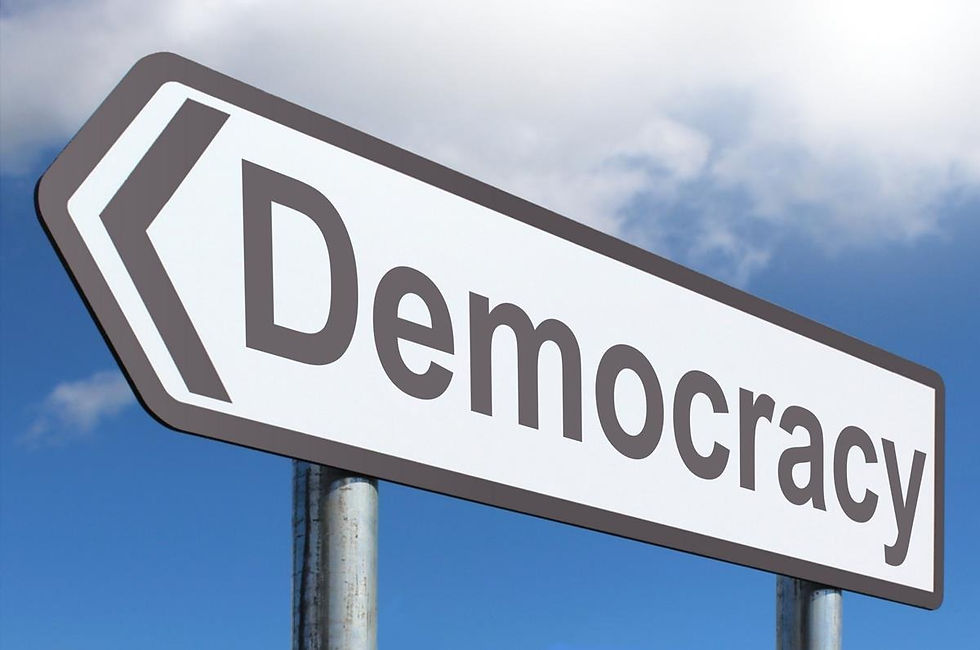How Star Wars Reflects – and Shapes – Real-World Politics
- Matthew Green
- Dec 13, 2019
- 3 min read

Leia Organa, Honorary Co-Chair of the National Women's March (photo by Mark Dixon)
Politics is a major feature of the Star Wars universe. Though the films and TV shows may not always portray politics convincingly, they provide useful insights into a variety of political phenomena, including the power vacuum that follows the end of an empire, the weakness of personalistic dictatorships, the behavior of political cartels, and the role of women in political insurgencies.
Why does politics play a significant role in Star Wars? It certainly serves as a useful plot device. (Can our heroes stop Senator Palpatine’s machinations? Will Luke Skywalker & Co. restore freedom to the galaxy?) But it also reflects the politically tumultuous time in which it was first written. And that, in turn, may explain why Star Wars is not only good entertainment but also teaches us about – and may perhaps even motivate – real-world political behavior.
When Lucas began developing the Star Wars screenplay in the early 1970s, U.S. politics was dominated by a seemingly unending war in Vietnam and the unfolding Watergate scandal surrounding the White House. They became inspirations for two main themes of the original film: the temptation of individual leaders to accrue more power at the expense of democratic institutions (Watergate), and how a resistance force can fight back against a more powerful opponent using unconventional means (Vietnam). (See Chris Taylor’s How Star Wars Conquered the Universe for more on this.)
Both themes are timeless, but Lucas ensured they would not become dated by avoiding specific historical references (apart from Nazi Germany) and having the action take place “a long time ago, in a galaxy far, far away.”
As Star Wars became embedded in popular culture, politicians were increasingly tempted to appropriate its characters and plot to make a point. Liberal critics of Ronald Reagan’s Strategic Defense Initiative dubbed it “Star Wars.” In 1991, Senator Max Baucus (D-MT) compared the Alternative Minimum Tax to Anakin Skywalker, starting with good motives but becoming “the Darth Vader of the Tax Code.” Challenging George W. Bush for the GOP presidential nomination in 2000, Senator John McCain (R-AZ) compared himself to Luke Skywalker fighting to escape the Death Star.
But more striking is how political dissidents use Star Wars to frame their arguments or even try to inspire protest. To take a few recent examples:
A Tea Party protest organizer recalled that “the feeling [of protesting against Obama] was wonderful, like you’re the rebels in Star Wars.”
After Donald Trump was elected president, Princess Leia-themed signs and costumes were a common sight at the National Women’s March, and one Trump opponent called for the formation of a new “rebel alliance”.
Anti-government demonstrators in Hong Kong distributed a poster depicting light saber-wielding protesters. (Ironically, their protests have hurt attendance at Disney’s Hong Kong theme park.)
I see these instances as more than a reflection of Star Wars’ popularity as escapist entertainment. They speak to how the politics of rebellion, dissent, and the struggle for liberty are what make Star Wars such an influential and appealing political mythos.
Indeed, that mythos may be more relevant today than ever. Congress is on the verge of impeaching a president who, like Nixon, has been accused of excessive abuse of power. Meanwhile, the Washington Post has uncovered substantial evidence of U.S. military and political failures in Afghanistan and efforts to cover up those failures—a disturbing repeat of what happened in Vietnam.
We may no longer live in the era of lava lamps, Led Zeppelin, and psychedelic light shows. But by capturing the political zeitgeist of the 1970s, Lucas managed to create an enduring film narrative that continues to inform and shape political life.




Comments